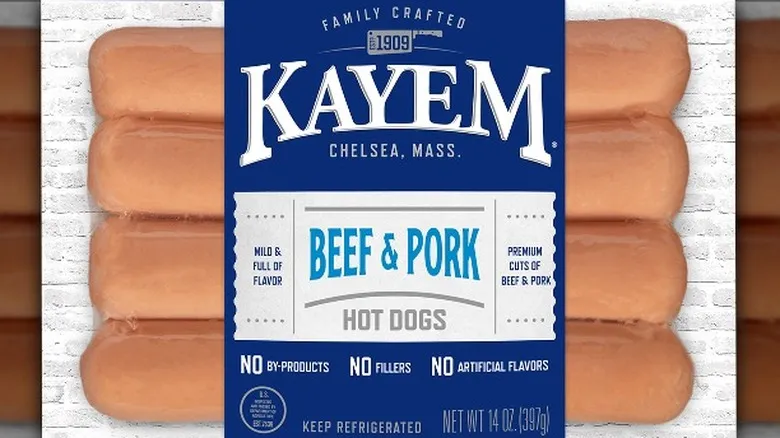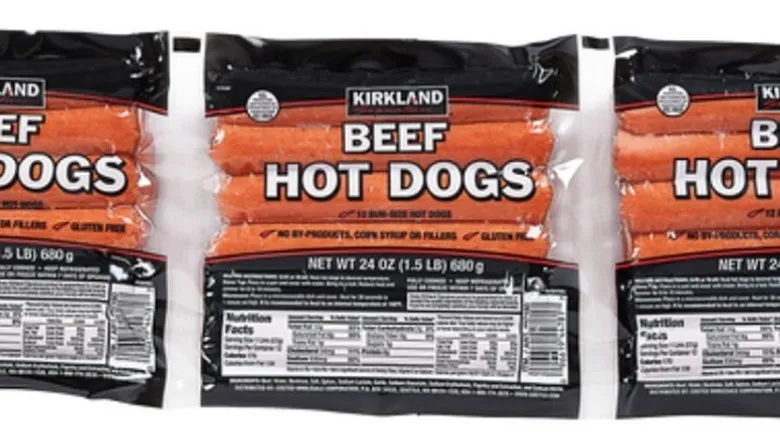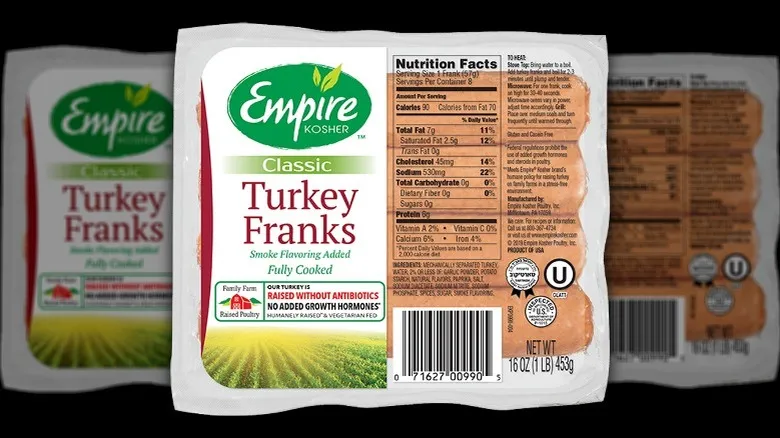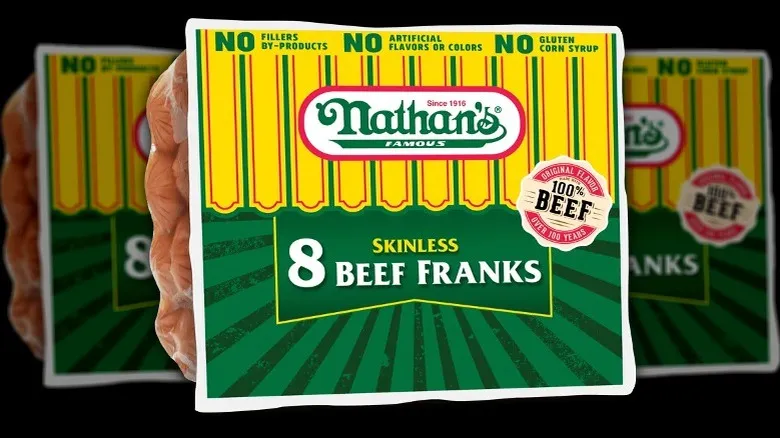Ball Park Prime Uncured Beef Franks

Ball Park Prime Uncured Beef Franks have their merits. They are crafted from 100% USDA prime beef and contain no added nitrates, by-products, fillers, or artificial flavors or colors. However, a glance at the ingredient list reveals several components that aren't exactly natural—such as dextrose, potassium lactate, sodium phosphate, and sodium diacetate. These additives serve purposes like enhancing flavor, preservation, and texture, but it’s clear that these hot dogs are not as minimally processed as the packaging suggests.
The term "uncured" refers to the lack of synthetic nitrites and nitrates, which are typical preservatives found in conventional hot dogs. Instead, these uncured varieties utilize natural nitrite sources, like celery powder. The primary concern with nitrites is that research has associated them with a heightened risk of certain cancers and type 2 diabetes, regardless of whether they are synthetic or naturally sourced. Additionally, each Ball Park Prime Uncured Beef Frank contains 230 calories and 20 grams of fat, including nine grams of saturated fat. Each hot dog also has 45 milligrams of cholesterol and a significant 710 milligrams of sodium. Ultimately, while the USDA prime beef and the lack of certain additives are positives, they do not sufficiently compensate for the presence of other less desirable ingredients in these franks.
Kayem Beef & Pork Hot Dogs

Kayem Beef & Pork Hot Dogs were designated as the official Fenway Frank in 2009, highlighting their immense popularity and flavor. However, when it comes to ingredient quality, these hot dogs fall short. They contain not just one, but two forms of added sugar: corn syrup and dextrose. The ingredient list also features several additives, such as potassium lactate, sodium diacetate, and sodium nitrite. High consumption of sodium nitrite, a preservative, has been linked to an increased risk of certain cancers and type 2 diabetes. Additionally, the long-term effects of other additives are not fully understood and could pose health risks in the future.
This suggests that regularly consuming highly processed foods—like Kayem Beef & Pork Hot Dogs—is likely not the best choice. The presence of these additives, along with a significant amount of saturated fat and sodium in each serving (5 grams of saturated fat and 430 milligrams of sodium), raises concerns about the overall quality of Kayem Beef & Pork Hot Dogs. While Red Sox fans may cherish them, the ingredient profile indicates that this product is heavily processed and not the healthiest option available.
Gwaltney Original Chicken Hot Dogs

Gwaltney Original Chicken Hot Dogs may seem like a healthier alternative to beef or pork hot dogs, but they come with their own set of issues. Although they are lower in calories and saturated fat—containing 90 calories and just 2 grams of saturated fat per hot dog—the quality of the ingredients raises some concerns. The main component is mechanically separated chicken, which is produced by forcing chicken through a sieve to extract the meat from bones, skin, and connective tissue. This method often incorporates a significant amount of fat and tissue, resulting in a product that is less nutritious and more processed. Consequently, the texture resembles a paste, which is typical of heavily processed meat items.
Unfortunately, that's not the end of the story. These hot dogs are loaded with corn syrup and various fillers, including sodium nitrite, a common preservative associated with potential health risks such as an increased likelihood of cancer and type 2 diabetes. While you might think you're making a health-conscious choice by opting for chicken hot dogs, Gwaltney Original Chicken Hot Dogs may not be as beneficial as you would expect.
Bar-s Classic Franks

The quality of Bar-S Classic Franks certainly warrants examination, beginning with the ingredient list. The packaging proudly claims that these franks contain no MSG or artificial flavors or colors; however, the absence of these ingredients does not equate to a healthy hot dog. Firstly, Bar-S Classic Franks are made with mechanically separated chicken, a process that involves pushing chicken through a screening device. This method not only extracts the meat but also includes fat, skin, and connective tissue, resulting in mechanically separated chicken being significantly less nutritious than ground poultry, which is derived from whole muscle cuts or deboned meat.
Additionally, the ingredient list features various fillers and additives, including corn syrup and dextrose—both processed sugars—as well as modified corn starch and sodium nitrite. While sodium nitrite is a widely used preservative, it has been associated with potential health concerns, including an increased risk of cancer and type 2 diabetes. The ingredient list continues with sodium phosphates, potassium lactate, and sodium diacetate, further emphasizing the highly processed nature of the product. Although they may be tasty and convenient, the ingredients indicate that they are far from being a wholesome choice.
Kirkland Beef Hot Dogs

Costco's Kirkland Beef Hot Dogs are popular among many consumers due to their excellent quality-to-price ratio. They boast several positive attributes, such as the absence of by-products, corn syrup, and fillers—features that few leading hot dog brands can claim. However, despite avoiding some questionable ingredients, they do have their downsides. The ingredient list reveals the presence of dextrose, a sweetener derived from corn, and sodium nitrite, a common preservative associated with potential health risks, including cancer and type 2 diabetes. These components detract from their overall nutritional quality.
Additionally, Kirkland Beef Hot Dogs are relatively high in fat, saturated fat, and sodium, which can be a concern if consumed excessively. Each hot dog contains 14 grams of total fat, including 6 grams of saturated fat and 1 gram of trans fat. To put this in perspective, that accounts for 22% of the daily recommended intake for total fat and 30% for saturated fat—all in just one hot dog. They also have a significant sodium content, with 530 milligrams per serving, representing 22% of the daily recommended limit. In summary, while the price of Kirkland Beef Hot Dogs is appealing, the quality of their ingredients leaves something to be desired.
Lightlife Smart Dogs

Lightlife Smart Dogs are plant-based hot dogs that might create the impression of being significantly healthier than conventional hot dogs. However, their absence of meat doesn't necessarily equate to better quality ingredients. These hot dogs are loaded with processed components. The primary ingredient is soy protein isolate, which is a highly refined form of soy. To improve flavor and texture, Lightlife incorporates various other processed ingredients such as soybean oil, canola oil, and tapioca starch, which may contribute to inflammation and provide limited health benefits compared to whole, less processed options.
Additionally, these meat-free hot dogs include two types of sweeteners: raw cane sugar and hardwood smoked sugar. Other additives consist of xanthan gum, guar gum, and carrageenan, many of which can also lead to inflammation and digestive issues. The list of additives continues with glutamic acid and pea protein. Ultimately, if you're seeking a hot dog with higher-quality ingredients and considering vegetarian options, Lightlife Smart Dogs may not be the best choice.
Empire Uncured Turkey Franks

Empire Uncured Turkey Franks proudly claim on their packaging that the turkeys used are free from antibiotics and growth hormones. However, it's important to clarify that this assertion can be somewhat misleading. In the U.S., the use of growth hormones in poultry is completely prohibited, meaning that no poultry-based hot dogs contain them. Delving further into the quality of Empire Uncured Turkey Franks, it's worth noting that the brand utilizes mechanically separated turkey. This process results in a mixture that includes not only meat but also skin and connective tissue, leading to a product that is far from the whole, lean turkey one might anticipate.
The ingredient list doesn't improve from there. Empire Uncured Turkey Franks include several additives, such as sodium nitrite, a preservative associated with potential health concerns, including an increased risk of type 2 diabetes and certain cancers. From a nutritional standpoint, these franks are also lacking, with each hot dog containing 190 calories, 10 grams of fat, and 660 milligrams of sodium. While they may not be the worst option available, the combination of additives and subpar nutritional value indicates that they are not the healthiest choice either.
Oscar Mayer Wieners

Oscar Mayer Wieners are the hot dogs that brought Oscar Mayer into the spotlight, partly due to the memorable jingle from 1963 that many can still hum today: "Oh, I'd love to be an Oscar Mayer Wiener!" However, their fame doesn't change the fact that these franks are made with several low-quality ingredients. The first two components listed on the label are mechanically separated chicken and turkey, indicating that you're not just consuming the prime cuts of the poultry. The term "mechanically separated" means that connective tissue and skin are blended into a paste along with the meat. Additionally, there's a long list of additives, such as dextrose, potassium lactate, sodium nitrite, and corn syrup. Despite the brand's claims of no fillers or by-products, the heavy use of additives and sweeteners suggests that these hot dogs are more processed than many consumers might prefer.
From a nutritional perspective, Oscar Mayer Wieners aren't the worst option available in grocery stores, but they certainly aren't the healthiest choice for a hot dog either. Each serving of one wiener contains 12 grams of fat, 5 grams of saturated fat, 30 milligrams of cholesterol, and 380 milligrams of sodium. If you're looking for a hot dog that evokes a sense of nostalgia, Oscar Mayer Wieners might be the perfect choice. However, if you're in search of a higher-quality frank, you may want to explore other options.
Dietz & Watson Deli Beef Franks

Dietz & Watson Deli Beef Franks may boast about their commitment to using only the finest ingredients, but a closer look at the ingredient list tells a different story. While the manufacturer avoids high fructose corn syrup and MSG, these hot dogs are far from being clean. The disparity between their claims and the actual ingredients suggests that their focus on quality may be more about marketing than reality. The ingredient list includes several additives such as sodium phosphate, sodium erythorbate, and sodium nitrite, the latter being a common preservative associated with health risks like cancer and type 2 diabetes. Additionally, the vague term "flavoring" raises questions about what exactly is included. Notably, it doesn't even specify "natural flavoring," which would be a slightly better option.
These hot dogs are not exactly a healthy choice. Each serving contains 11 grams of total fat and 4 grams of saturated fat, along with 25 milligrams of cholesterol and 420 milligrams of sodium. These figures are quite high, and excessive intake of saturated fat, sodium, and cholesterol can lead to various health problems. Ultimately, it appears that Dietz & Watson's claims of premium products fall short when it comes to their Deli Beef Franks.
Nathan's Famous Skinless Beef Franks

Back in 1916, Polish immigrant Nathan Handwerker launched a hot dog stand in Coney Island. Today, Nathan's Famous has become a globally recognized brand. A significant part of its success can be attributed to the fact that their hot dogs are made with 100% beef, containing no fillers, by-products, artificial flavors, colors, or corn syrup. While this is a solid foundation for a quality sausage, the presence of numerous additives detracts from their appeal.
One such additive is sorbitol, which can lead to digestive problems when consumed in large amounts. Sodium nitrite, a widely used preservative, has been associated with a higher risk of cancer and type 2 diabetes. Additionally, hydrolyzed corn protein may trigger allergic reactions and inflammation. These ingredients underscore the processed nature of Nathan's Famous hot dogs. While no hot dog is particularly healthy (after all, it is a hot dog), it would be great if Nathan's Famous could find a way to create a hot dog with significantly fewer additives.
Sahlen's Natural Casing Smokehouse Hot Dogs

Sahlen's Smokehouse Hot Dogs rank among the most expensive options on this list, but that doesn't necessarily indicate a superior quality of ingredients. Like many other hot dogs mentioned here, they are loaded with additives and fillers. For starters, they include two types of sweeteners: corn syrup and dextrose. Additionally, they contain some vague "flavorings," leaving consumers uncertain about what they are actually consuming. Other additives present are hydrolyzed soy and corn protein, sodium erythorbate, sodium phosphate, and sodium nitrite. The presence of sodium nitrite has been linked to an increased risk of cancer and type 2 diabetes.
From a nutritional standpoint, Sahlen's Smokehouse Hot Dogs are not impressive either. Each serving has 15 grams of fat, including 5 grams of saturated fat, and a significant 630 milligrams of sodium. Consistently high levels of saturated fat and sodium can lead to cardiovascular problems. In summary, despite their premium price tag, Sahlen's Smokehouse Hot Dogs do not provide a healthier or higher-quality option.
Hatfield Beef Franks

Hatfield Beef Franks are marketed as a farm-to-table product on the company's website, but the ingredient list on the packaging tells a different story. While the franks are free from MSG, they are loaded with various sweeteners and additives. This doesn't quite align with the concept of "farm to table," does it? For instance, Hatfield Beef Franks contain three types of sweeteners: corn syrup, sugar, and dextrose. Additionally, there are several additives, such as sodium phosphate, sodium erythorbate, and sodium nitrite. The presence of sodium nitrite is particularly alarming, as it has been associated with higher risks of cancer and type 2 diabetes.
Furthermore, each hot dog contains 15 grams of total fat, 7 grams of saturated fat, 30 milligrams of cholesterol, and 520 milligrams of sodium. These amounts are significantly high, and excessive intake of saturated fat, cholesterol, and sodium can contribute to cardiovascular problems. While Hatfield Beef Franks may be tasty, the extensive use of sweeteners and additives, along with their unfavorable health profile, makes them a less-than-optimal choice for those seeking high-quality hot dogs.
Hebrew National Beef Franks

Hebrew National Beef Franks are well-known for being kosher, which means they comply with specific Jewish dietary laws. These kosher standards not only determine which foods are permissible but also outline the methods of preparation and processing, ensuring a certain level of cleanliness, quality, and ethical treatment that often implies superior food quality. However, despite their kosher certification, these hot dogs contain a variety of additives that undermine their quality. The ingredient list is filled with highly processed substances, such as sodium lactate, hydrolyzed soy protein, sodium diacetate, sodium erythorbate, and the vague term "flavoring." The presence of sodium nitrite is particularly concerning, as it has been linked to certain cancers and type 2 diabetes.
In reality, Hebrew National Beef Franks depend on a range of additives and preservatives. These components diminish the overall quality and healthfulness of the product, making it a less appealing option for those seeking genuinely high-quality hot dogs.
How we chose the hot dogs on this list

In compiling this list, we focused on the quality of ingredients in each hot dog. Ideally, a top-notch hot dog should primarily consist of pure beef, pork, or chicken (or be vegetarian) and contain minimal additives, sweeteners, and preservatives. Unfortunately, many hot dogs on this list do not meet these standards. Instead, they often include heavily processed components, such as mechanically separated meats that incorporate less desirable parts like skin and connective tissues, which are neither appealing nor healthy.
We also examined the types of additives present. Sodium nitrite, a common preservative in many of these hot dogs, has been associated with significant health risks, including cancer and type 2 diabetes. A superior hot dog would steer clear of such chemicals, opting for natural preservatives or eliminating them altogether. The presence of added sugars and sweeteners, such as corn syrup, sugar, and dextrose, raised additional concerns. These ingredients not only diminish the healthiness of the hot dogs but also contribute to problems like obesity and diabetes. Lastly, we assessed the nutritional content, paying particular attention to saturated fat, cholesterol, and sodium levels. An exceptional hot dog should offer a healthy balance of protein and beneficial fats without overwhelming you with harmful substances. With these considerations in mind, we highlight the hot dogs that fall short of high-quality ingredient standards, enabling you to make more informed choices while shopping in the grocery store.
Recommended

How Piggly Wiggly Became The First Modern Grocery Store

What You Need To Know To Choose The Tastiest Watermelon At The Store

The First Thing You Should Do When You Open A Costco Card

The Reason Your Grocery Store's Dairy Aisle Is In The Back Left Corner
Next up

